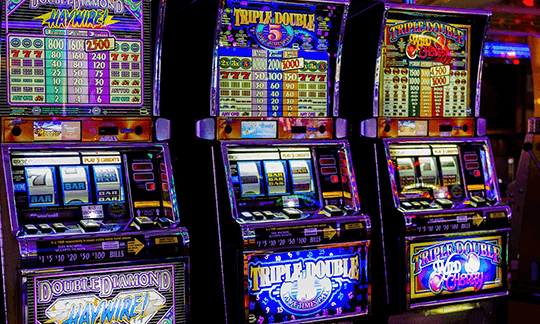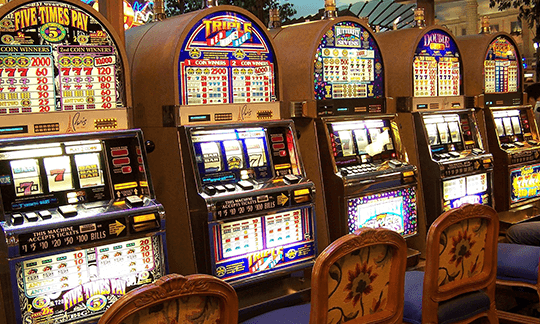The maths behind high volatility and low volatility slots
Slot volatility is a topic often discussed by players but seldom understood in its entirety by the playerbase. Often players mistake slot volatility with payout percentage (or RTP) and get frustrated with high variance slots because their expectations are higher than they should be. On the following page we seek to better explain these terms and deliver some background knowledge in the hopes of improving our players' experience.
Understanding volatility and variance
This is already one of the biggest points of contention among slot fans. High variance and high volatility are basically the same thing. Same goes for low variance slots and low volatility games. Two different terms for the same thing. We will use these terms interchangeably throughout this article to get you used to them. The next time you run into someone tossing terms like high variance and low variance games around while talking about volatility you get to understand them better, or perhaps even point out an error in their arguments. Whether a slot machine is volatile or not should never be the question asked. Instead, the slot should be understood as naturally being of a certain variance. Additionally, a Jackpot is not a deciding criteria of high variance slots or low volatility slots. Jackpots are separate game mechanics and depend on other factors, such as the nature of the Jackpot itself (static vs. progressive for example) or associated bonus game modes. Especially those bonus game modes can use entirely different models of volatility. Other bonus features of any given slot may also be able to alter the slot's volatility for a few rounds - or the duration of an associated mini game - and may lead to big wins with higher consistency than expected, especially in the case of low variance slots. Low volatility games sometimes also are part of a franchise, where sequel games adopt mechanics and rates from high volatility games instead. There is also little point to avoiding slot machines of a particular brand, since there no developers specialising in only on type of slot.
Finally, there is never the issue of playing "volatile slots" or not. All slots are, be their very definition, volatile. In common parlance playing "volatile slots" usually means playing high volatility slots, nothing more.

Mathematics in gambling
Every slot machine is strictly governed by probability. Moving past ritual and superstition, slot games are governed by mathematics and have to be checked and tested by independent parties before a slot player may even get their hands on it. This is true for both land-based slot machines as well as online slots. Modern gambling companies and developers employ professional mathematicians to ensure the integrity of their games, as much as third parties and government bodies employ mathematicians of their own who test the games for jackpots, their variance and their volatility. Our online slots for example are all tested by several independent parties and are fully compliant with the Great Britain Gambling Commission. This isn't just to help us with the powers that be, it's also to guarantee a good gaming experience for our players, since being compliant with these government institutions means serving slot games with consistent return-to-player-rates (RTP) and volatility according to their developer's specifications. It also means that any given slot machine's bonus features remain untempered with.
To reiterate: Probability is, at its cores, a way of describing how likely a certain even is to occur. It is a subset of the field of mathematics, and finds application in almost every scientific, technological and programming field part of modern life. A slot machine is a game of chance subject to probabilities as much as any other game. High volatility, medium volatility or low volatility are terms to express how frequent wins could be, as well as how big prizes may end up being. Bonus features may change slot volatility for their duration but will not change the machine's volatility overall.
What does volatility for slot games mean?
Volatility is used to describe the rate of occurrence of wins in a slot and correlated sizes of wins. It describes how often you can expect to win at a given slot and how high that win could supposedly be. Of course the latter part is subject to parameters such as total bet, global multipliers (in some slots free spins pay out double or more by default) or even existing promotions. An important thing to understand is that a playing low volatility slots does not mean playing at a disadvantag compared to high volatility games. Similarily, there is no playing "volatility slots". Playing volatility slots would be the same as one saying they are playing "high-random Roulette", or "variance Baccarat". They are casino games. As such, randomness and reduced predictability are core parts of their gameplay, ruleset and overall feeling.

An intro to high volatility slots
Simply said, high volatility slots are slots where wins happening fewer times but when they happen players can expect their payout to be larger. Traditionally, high volatility slots attract high-risk players or those looking for big wins specifically. Additionally, these high variance slots (another term for slots high in volatility) are often the target of bonus programmes or other promotions. High volatility slots offer lower rates of wins per spin, but big wins in a spin you hit a winning combination.
What is a volatility index?
Simply put, a volatility index of any slot is a table showing all possible outcomes of a round played at that slot contrasted with their likelihood of happening. Resulting values are often in the low two-digit ranges. This volatility index is communicated between slot developer, online casino and government bodies and is usually one of the first things being checked.
Which slot is the right for you?
Good question, difficult to answer. If you are chasing big wins and can withstand several rounds in between payouts, then high variance slots might be your thing. If you like to set a bank roll beforehand and want to play as long as possible off of it, then low volatility slots might be more to your tastes. No matter which kind of playstyle you prefer, always keep in mind that volatility might be a factor in every spin, while payout percentage is a statistical value recorded over the entire lifespan of a given slot.
What can I do to influence volatility?
Nothing. Slot games do not believe in rituals or superstition. The machine does not consider the last half hour you played the same you do. The machine doesn't know or care for the way you rubbed your hands before you played the next round. The machine also does not care about the way you combed your hair or sang a song before starting your free spins. Slot volatility has to be the same for every player, otherwise the whole affair would be entirely pointless, wouldn't it?
What are good slots to play where volatility isn't as big an issue?
Classics like Sizzling Hot or Starburst are known for low to medium volatility. Games like Book of Ra Deluxe or Lucky Lady's Charm Deluxe are known for being medium to high in volatility. Our assortment of online slots covers all kinds of volatility ranges, so you are bound to find a slot suiting your tastes in no time!









